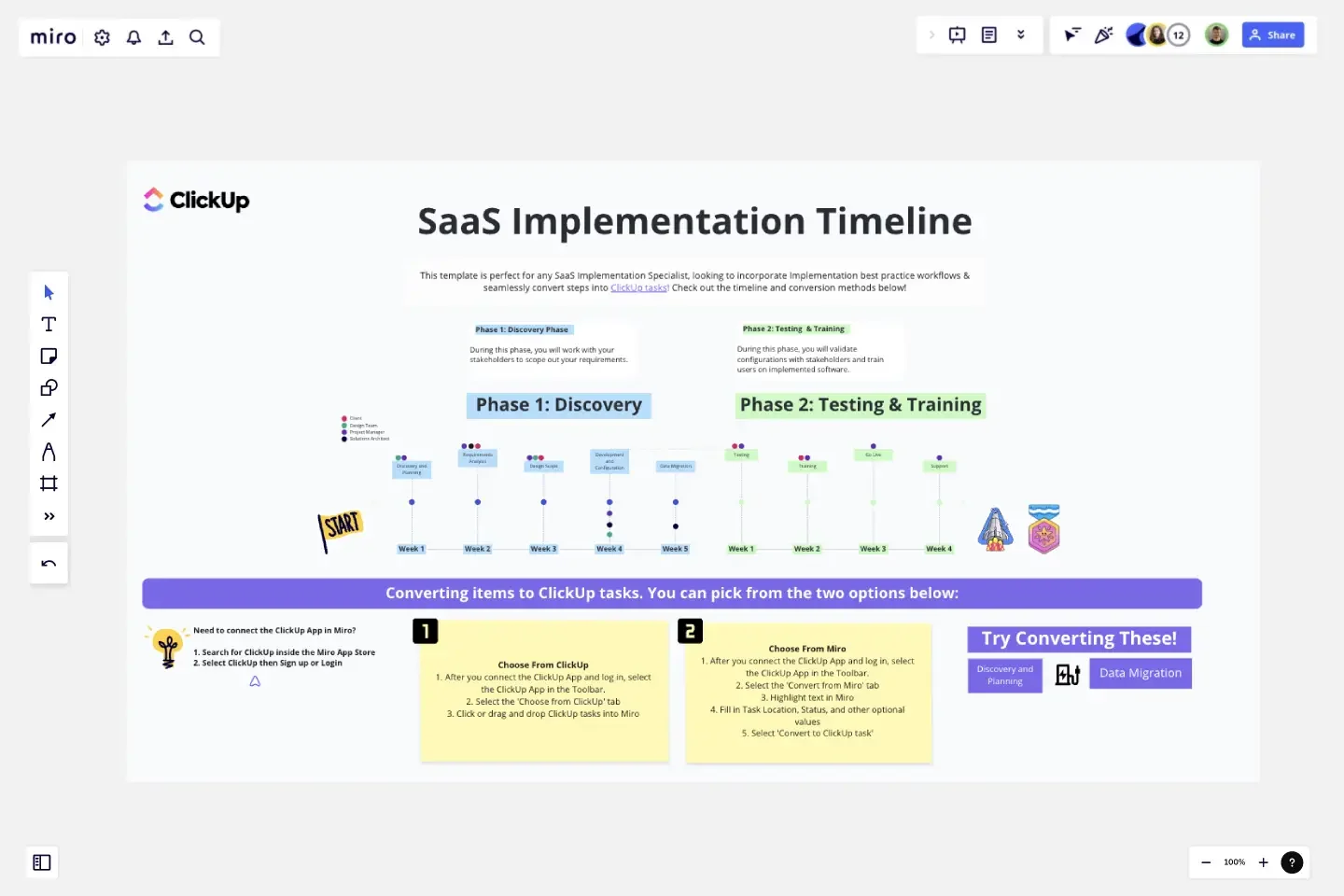SaaS Implementation Timeline
This template was created for Implementation/Professional Service Consultants to help them through their implementation process (from discovery to implementation + training).
In this template:
Discovery Checklist/Subtask Items:
Validate Scope of Work & Deliverables, potential roadblocks from client/implementation team, understand key stakeholders, etc.
Data Migration:
What is the process/mechanism for migrating data, what is the rollback plan if it is not successful, etc.
This template was created by ClickUp.
Get started with this template right now.
Lean Inception
Works best for:
Agile, Meetings
Lean Inception is a collaborative workshop for aligning teams on project goals and scope. It provides a structured framework for defining the product vision, user personas, and feature prioritization. This template enables cross-functional teams to collaborate, validate assumptions, and establish a shared understanding of the project vision and objectives. By promoting early alignment and customer-centric thinking, Lean Inception empowers teams to kickstart projects with clarity and purpose, driving efficiency and innovation from the outset.
Daily Stand-up Meeting Template
Works best for:
Agile Methodology, Meetings, Software Development
The entire team meets to review the day before and discuss the day ahead. These daily meetings, also known as “scrums,” are brief but powerful — they identify roadblocks, give each team member a voice, foster collaboration, keep progress on track, and ultimately keep teams working together effectively. This template makes it so easy for you to plan daily standups for your sprint team. It all starts with picking a date and time, creating an agenda, and sticking with the same format throughout the sprint.
Miro Basics: Guide for New Participants
Works best for:
Agile
The Miro Basics: Guide for New Participants template offers a comprehensive overview of essential Miro functionalities and best practices for new users. It provides step-by-step instructions, tips, and examples to help participants navigate the Miro platform confidently and effectively. This template empowers new users to leverage Miro's collaborative features and unleash their creativity in visual collaboration. By promoting proficiency and engagement, the Miro Basics: Guide for New Participants enhances collaboration and productivity across teams.
Learning Loop Retro Template
Works best for:
Retros, Agile
The Learning Loop Retro template is a powerful tool designed to help teams reflect on their projects by recognizing successes and identifying areas for improvement. This template is part of Miro's Intelligent templates, which streamline workflows and keep teams engaged by integrating AI, interactive tools, and seamless integrations. One key benefit of the Learning Loop Retro template is its ability to drive continuous improvement. By regularly reflecting on their work and identifying areas for enhancement, teams can consistently elevate their performance and achieve better outcomes.
Feature Planning Template
Works best for:
Desk Research, Agile Methodology, Product Management
Features are what make a product or service fun, but adding new ones is no walk in the park. It takes many steps—ideating, designing, refining, building, testing, launching, and promoting—and just as many stakeholders. Feature Planning lets you put a smooth, sturdy process in place, so you can add a feature successfully, and spend less time and resources doing it. That makes our Feature Planning Template a smart starting point for anyone looking to add new product features, especially members of product, engineering, marketing, and sales teams.
Lean Coffee by Michael de la Maza
Works best for:
Agile Methodology
Lean Coffee is a collaborative meeting format that encourages open dialogue and self-organization. Participants suggest discussion topics, vote on them, and engage in time-boxed conversations. This template provides a structured framework for facilitating Lean Coffee sessions, enabling teams to address issues, share knowledge, and make decisions collectively. By fostering inclusivity and autonomy, Lean Coffee empowers teams to drive meaningful discussions, build consensus, and drive continuous improvement.
